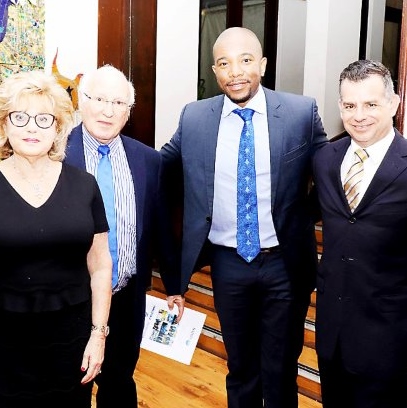SA
Mmusi Maimane talks to the Durban community
Democratic Alliance leader Mmusi Maimane told a packed audience at the annual launch of the Israel United Appeal-United Communal Fund (IUA-UCF) campaign in KwaZulu-Natal on October 31 that “when things fall apart, they do fall into place”.

LAUREN SHAPIRO
Despite the nine million people in the country who cannot find work and the 53 per cent categorised as poor, Maimane says he is “more hopeful about South Africa now than I’ve ever been”. He hopes the pivotal 2019 election will result in a coalition government leading a country united by values, not divided by race.
“People see things as black or white. It’s not ‘or’. It’s ‘and’. It’s black and white, it’s urban and rural, it’s labour and business – it’s all of us.”
He added: “I can see state capture. I can see corruption. We can all see that. But the question I would like to attempt to answer is what about the future? What changes do we hope to see?”
He outlined his economic vision, which includes city-driven schemes to avoid national corruption. He wants to focus on education, sustainable energy, entrepreneurship, tourism, manufacturing and mining, among other things. He also advocates a smaller Cabinet to reduce expenses, and 15-year sentences for corrupt politicians.
Maimane attended the 2017 Absa Jewish Achievers Awards and said he was “impressed not just by the capital in the room, but the skills and innovation”. He congratulated the South African Jewish community on their participation in the national economy. “Your contribution is more needed today than at any time in the past,” he implored.
Maimane said that his recent visit to Yad Vashem, which inspired him with “the triumph of human beings over a particularly devastating aspect of history”, reminded him that anything is achievable.
“I’d rather talk about what is possible,” he concluded. “Not what is happening, but what is possible.” He received a standing ovation.
A hallmark of any Jewish community is supporting each other and there was a slogan emblazoned on a screen in the hall that read: “We look after our own – from cradle to grave”. However, this is becoming increasingly difficult. “The economic climate is causing pain in our community and we are incredibly fortunate to have the support of the IUA-UCF to help look after our own and ease some of the pain for our most vulnerable,” said Jeremy Droyman, president of the South African Jewish Board of Deputies (SAJBD) KwaZulu-Natal Council.
Michael Selikow, chairman of the United Communal Fund, noted that the fund is “totally reliant on the generosity of our donors, without whom we would not be able to provide our beneficiaries these much needed funds and continue to make it possible to let them live with dignity.”
Some of the fund’s biggest recipients are Durban Jewish Social Services, Durban’s Jewish senior citizens’ home Beth Shalom, and the community’s youth, including Bnei Akiva and Netzer.
Selikow also praised It’s Durban Calling, a new social media project that aims to raise both awareness and money for the Durban Jewish community. To date, It’s Durban Calling has collected hundreds of thousands of rands. 2 284 individuals engage across the various digital platforms, reuniting globally dispersed members of a very special community.